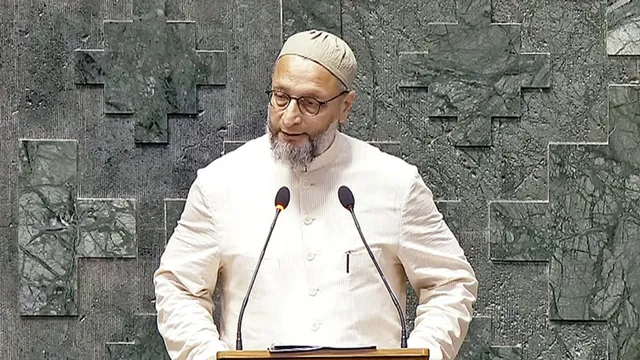- By Mayukh Debnath
- Tue, 25 Jun 2024 10:46 PM (IST)
- Source:JND
Parliament Session: AIMIM leader Asaduddin Owaisi stoked a controversy by raising a slogan in favour of a conflict-hit West Asian country immediately after taking oath as a member of the newly elected 18th Lok Sabha on Tuesday. Following an uproar from the treasury benches, the Chair ordered that the remarks be expunged. Owaisi, however, defended his action.
Speaking to reporters outside the House, the Hyderabad MP said, "Everyone is saying a lot of things...I just said 'Jai Bhim, Jai Meem, Jai Telangana, Jai Palestine'...How it is against, show the provision in the Constitution." Responding to a query about why he mentioned Palestine, the AIMIM MP said, "They are oppressed people."
#WATCH | On his words while taking the oath, AIMIM president and MP Asaduddin Owaisi says, "Everyone is saying a lot of things...I just said "Jai Bhim, Jai Meem, Jai Telangana, Jai Palestine"...How it is against, show the provision in the Constitution..." https://t.co/dirMZIMYtX pic.twitter.com/m6eOGYQDrZ
— ANI (@ANI) June 25, 2024
Amid a din by BJP members in the Lok Sabha over Owaisi's remarks, Radha Mohan Singh, who was in the chair at the time, assured the MPs that nothing extra besides the oath ceremony would go on record.
Speaking on the row, Parliamentary Affairs Minister Kiren Rijiju said he was in receipt of complaints from some members about the mention of Palestine, adding that he will check what the rules say about such a scenario.
"We do not have any enmity with Palestine or any other country. While taking the oath is it proper for any member to raise the slogan praising another country," Rijiju was quoted as saying by news agency ANI.
Raking up the issue on social media, BJP IT Cell head Amit Malviya posted on X a snippet of Article 102 of the Constitution, highlighting the various grounds on which an MP can be disqualified. "As per extant rules, Asaduddin Owaisi can be disqualified from his Lok Sabha membership, for demonstrating adherence to a foreign State, that is Palestine," Malviya said in his post.
What Does Article 102 Of The Indian Constitution Say?
A person shall be disqualified for being chosen as, and for being, a member of either House of Parliament
(a) if he holds any office of profit under the Government of India or the Government of any State, other than an office declared by Parliament by law not to disqualify its holder;
(b) if he is of unsound mind and stands so declared by a competent court;
(c) if he is an undischarged insolvent;
(d) if he is not a citizen of India, or has voluntarily acquired the citizenship of a foreign State, or is under any acknowledgement of allegiance or adherence to a foreign State;
(e)if he is so disqualified by or under any law made by Parliament.
(With inputs from agencies)

